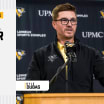Penguins general manager Jim Rutherford and head coach Mike Sullivan met with the media following the team's locker room clean out day. Here are the biggest takeaways from that session…
* Rutherford will take time to assess the roster before making any changes
* Rutherford believes the team has tradable assets if needed
* Rutherford doesn't think this locker room ever came together as a team
* Rutherford believes the Pens lacked eagerness, determination against Islanders
* Rutherford thought the team played its best in March
* Sullivan, coaches will assess strategy, style and tactics in offseason
* Sullivan felt team's biggest flaw was inconsistency in being hard to play against; believes that's the missing part of team identity
* Sullivan's goal is to get 100-percent buy-in on that portion of team identity
State of the Team

CHANGES?
Every season brings changes to a roster. The question for Pittsburgh is what changes are needed and how to accomplish that feat. With the emotional First Round loss to the New York Islanders still fresh, Rutherford will take some time before answering those questions.
"I think the best thing for me to do is take a little bit of time to think through this," he said. "I'm in the middle now of meeting with as many people who have input in our organization as I can, from coaches to hockey ops to ownership. That'll take a little time to work through that. Then some big decisions will have to be made. There will be changes in our team."
Rutherford doesn't think the team is far from contending for another Stanley Cup. With the core of Sidney Crosby, Evgeni Malkin and Kris Letang, the team will have a legitimate chance moving forward. But changes need to be made.
"I don't think (we can win) as is, but the window is still open," Rutherford said. "It should be open for more than just one year. Based on how things finished, we're not going to be able to do it the way we finished."
TRADE BAIT
To get good players you have to move good players. Rutherford believes that the Pens still have enough good assets on the team that will be attractive to other teams for possible transactions.
"We have a lot of good players, and players that have good resumes," Rutherford said. "Players that have won Stanley Cups and players that have contributed big to that. Depending on what changes we decided to make, we have valuable assets to make some of those changes."
DISSECTING THE TEAM
At the end of every season one team celebrates winning the Stanley Cup - as the Pens did after winning back-to-back titles in 2016 and '17 - while 30 other teams analyze what went wrong. For Rutherford, the problem was that this collective group of talented players never found a way to mesh as a team.
"In those years that we won we were a team, we were a very tight-knit team," he said. "I didn't see that this year almost from Day 1. I didn't see a point where guys came together as a team."
Rutherford suggested that complacency may be the root of the issue.
"I wonder if it's because there's too many guys content with where they're at in their careers after winning a couple of Stanley Cups," he mused. "Is that a signal where some of that has to be changed, where you get that eagerness again?"
That's a question he'll be looking to address this offseason.
WHAT WENT WRONG IN THE PLAYOFFS?
Rutherford didn't hold back when it came to why the Pens came up short against the Islanders, and failed to win even a single game.
"There were a bunch of things different between the Islanders and the Penguins, and the reason the Islanders won four straight," he said. "They played the right way, and they were eager to win. They were determined. And the Penguins weren't."
TRENDING RIGHT
Despite all the struggles this season, the Pens played their best hockey in March as they battled for a playoff spot. The team went 10-3-3 despite missing stars Malkin and Letang due to injuries. And among those 10 wins were victories against Washington, Boston and Nashville.
"Our team played as a team in March," Rutherford said. "We had a tough schedule, we played a lot of games. We played the game the right way. That's when we played at our best.
"We were tracking toward being a good playoff team and then we ran up against a team that was more determined and played the game the right way, and we played at a higher risk."
But Rutherford pointed to that exceptional March as a reason for optimism.
"It was there. We saw it in March," he said. "It can certainly be there in the future, but it won't be the exact same people."
OFF-SEASON ASSESSMENTS
Sullivan and his coaching staff will do a lengthy assessment of last season and prepare for the next. It's something they do every year to cover every aspect of the team.
"We'll look at the league and some of the tendencies and how teams are playing in different aspects of their game and what the 'best practices' are around the league," Sullivan said.
Part of the assessment will be the Pens' own style and brand.
"We'll see from a tactical standpoint if we need to adjust or change any of the system play or strategy that we try to deploy here with our group," he said. "Having said that, we tried to install a game plan that would give our core players the best opportunity to have success based on their strengths.
"Do we need to change our strategies to maximize the group that we have?"
"HARD TO PLAY AGAINST"
Rutherford and Sullivan gave some pushback to the notion that the Pens were slower than in years past. However, Sullivan admitted that the missing piece of the team's identity this season was being "hard to play against."
"The area of our identity that we've lost a little bit is the 'hard to play against' aspect," Sullivan said. "When we've had success as a group with these core players we were a team that could score goals, but what went unnoticed and not discussed much was that we were hard to play against."
Encapsulated in being hard to play against is having back pressure, defending hard, limiting opportunities at the net, limiting odd-man rushes, making good puck decisions, making opponents earn scoring chances, having cooperative effort, commitment and compete.
All of those aspects came together for the team's successful run in March.
"Our challenge moving forward is we have to become a team that part of its identity is being a team that's difficult to play against," Sullivan said. "When you look at the month of March as an example, we were a team that was hard to play against."
100-PERCENT BUY-IN
Sullivan wants his team to excel in all the areas listed above. But that takes commitment on part of the players.
"The challenge is to make sure there is 100-percent buy-in throughout the lineup," he said.
The Pens had mixed results this season, because the players' buy-in was inconsistent.
"We had periods of time where there was lots of buy in and we got results because of it," Sullivan said. "What was frustrating from our coaching staff standpoint is the inconsistency of our season."
As for why the buy in wasn't always consistent, Sullivan was puzzled.
"I don't have a definitive answer for you at this point," he said. "You're trying to understand mindsets of players and mindsets of teams. Human nature is hard to figure out sometimes. That's one of the biggest challenges of coaching."


















































